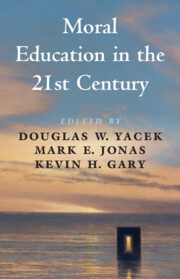Book contents
- Moral Education in the 21st Century
- Moral Education in the 21st Century
- Copyright page
- Contents
- Contributors
- Acknowledgments
- Chapter 1 Why Does Moral Education Matter in the 21st Century?
- Part I Historical Insights for Contemporary Moral Education
- Part II New Approaches to Moral Education
- Part III Responses to Contemporary Moral Problems
- Chapter 13 Moral Education in and for Virtual Spaces
- Chapter 14 The Consumerist Threat to Education and Democracy
- Chapter 15 Moral Education and Deep Disagreement
- Chapter 16 A Character-Based Perspective on Sexual Ethics and Sex Education
- Chapter 17 The Moral Eclipse of Boredom
- Index
- References
Chapter 15 - Moral Education and Deep Disagreement
from Part III - Responses to Contemporary Moral Problems
Published online by Cambridge University Press: 01 June 2023
- Moral Education in the 21st Century
- Moral Education in the 21st Century
- Copyright page
- Contents
- Contributors
- Acknowledgments
- Chapter 1 Why Does Moral Education Matter in the 21st Century?
- Part I Historical Insights for Contemporary Moral Education
- Part II New Approaches to Moral Education
- Part III Responses to Contemporary Moral Problems
- Chapter 13 Moral Education in and for Virtual Spaces
- Chapter 14 The Consumerist Threat to Education and Democracy
- Chapter 15 Moral Education and Deep Disagreement
- Chapter 16 A Character-Based Perspective on Sexual Ethics and Sex Education
- Chapter 17 The Moral Eclipse of Boredom
- Index
- References
Summary
In this chapter, I argue that when common school teachers engage in moral education under conditions of deep disagreement, they cannot live up to liberal standards of justice. These standards demand that teachers treat a wide range of moral beliefs fairly. In practice, teachers who engage in moral education cannot avoid stigmatizing a range of students who hold legitimate moral beliefs. In support of this claim, I present a common approach to moral education that I regard as most likely to meet liberal standards of justice. I then argue that under conditions of deep disagreement, even the most skilled and well-intentioned teachers could not have the time or resources to treat all of their students’ views fairly. Finally, I suggest ways that teachers can mitigate the problem, in the hope that others will find better solutions.
- Type
- Chapter
- Information
- Moral Education in the 21st Century , pp. 281 - 305Publisher: Cambridge University PressPrint publication year: 2023

